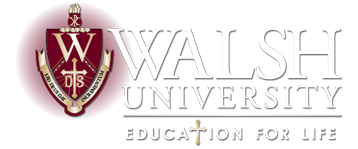The Occupational Therapy program at Walsh University has been designed to provide students with experiences in a wide variety of fieldwork settings so they understand the full scope of occupational therapy practice.
The content of the academic program has been designed to cover the standards established by the Accreditation Council for Occupational Therapy Education (ACOTE) with a focus on assuring that the graduating students are able to pass the written examination National Board for Certification in Occupational Therapy (NBCOT). The Fieldwork I and Fieldwork II opportunities available to Walsh students have been selected and organized to provide real-life opportunities for the application of the content learned in the classroom.
The curriculum covers six semesters. In the first semester of the first year, students will have all coursework on campus with no scheduled fieldwork. Each of the following three semesters will include a 2-credit hour course titled "Fieldwork I." During the final two semesters, students participate in 24 weeks of "Fieldwork II" experiences.
Preparing Students to Explore
The field of occupational therapy provides opportunities for therapists to work in a wide variety of settings. The Walsh OT program has networked with clinicians in both traditional and emerging settings, primarily in Ohio, but also in other states and countries. Students who would like to explore OT internationally will be provided an opportunity to take an international elective.
FIELDWORK I
The Fieldwork I opportunities have been developed through communication and in cooperation with sites that are within 75 miles of Walsh University. The FWI experiences provide an opportunity for rich, structured observations and participation in the field. Each FWI course will provide students with the opportunity to apply information learned in the classroom.
Students in the OT program are responsible for transportation to assigned sites; this will require weekly access to sites that are within 70 minutes of Walsh University.
Potential Settings
- Hand Rehab Center
- Driving Rehabilitation Programs
- Low Vision Rehabilitation
- Independent Living Centers
- Hippotherapy Programs
- Homeless Shelters
- Early Intervention
- Private Schools for Specific Conditions (Autism, ADD/LD, DD, Deaf, etc…)
- Work/Industry
- Pediatric In-Patient Rehabilitation
- Community-based Developmental Disabilities Workshops and Day Centers
FIELDWORK II
The Accreditation Council for Occupational Therapy Education (ACOTE) requires OT programs to structure 24 weeks of FW II experiences. The OT program has networked with sites in and outside of the state of Ohio. Student interests, preferences, and demonstrated abilities will be considered in the placement of FW II assignments.
Walsh University is committed to encouraging exploration and understanding the full scope of occupational therapy practice while respecting learning preferences. Level II fieldwork placements are determined through student and academic fieldwork coordinator collaboration while considering available sites at the time of placement, geographical requests, career interests of the student, appropriateness of site for the student with the most emphasis on providing well-rounded experiences needed for passing the national board examination. The FW II experiences are scheduled during the last two semesters of the curriculum and will require 24 weeks of full-time learning in at least two different settings.
Potential Settings
- Home-Based Therapy
- Schools
- Acute Care
- Adult Out-Patient Therapy
- Long Term Acute Care
- Rehab
- Skilled Nursing Facility
- Assisted Living Facility
Students are responsible for the cost of travel and housing on Fieldwork II placements. Students will typically be assigned to locations 9 months to one year prior to the beginning of the fieldwork experience. Students are responsible for arranging their own transportation, and for locating their own housing. Some sites provide limited assistance (e.g. lists of places where other students have stayed in the area). If students have support systems out of state (family or friends), the academic fieldwork coordinator can work with the student to identify high quality placements in those areas. There are no guarantees that sites can be identified or that they will agree to offer a fieldwork experience.
